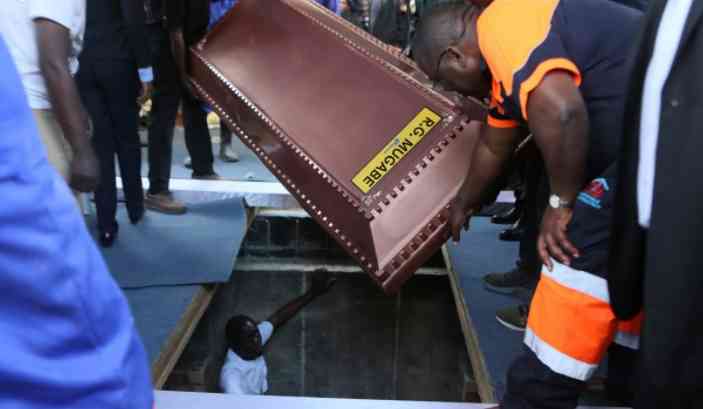
FORMER President Robert Mugabe’s children Bona, Tinotenda and Chatunga have scored a major legal victory after magistrate Kudzanai Mahaso barred a Zvimba headman from conducting an inspection of the late leader’s grave as part of a legal bid to exhume his remains.
Headman Tinos Manongovere had applied to the magistrate for an inspection in loco at the gravesite where Mugabe’s remains are buried.
Mugabe’s children opposed the application and the court, by consent of the parties, conducted an inspection in loco at the gravesites in Kutama village, where other Mugabe family members were buried.
Zimbabwe’s long-time ruler was buried inside his homestead as the family wanted to fortify the grave in order to block exhumation.
A month ago the court visited the National Heroes Acre, to tour an empty were buried.
Zimbabwe’s long-time ruler was buried inside his homestead as the family wanted to fortify the grave in order to block exhumation.
A month ago the court visited the National Heroes Acre, to tour an empty mausoleum meant for Mugabe’s burial.
An inspection in loco is a process whereby a court orders an inspection of a property or a site to gather evidence or to clarify facts in a case.
- Brito bristles at Baobab swamp
- Kamambo’s board is the best: Sibanda
- Mugabe burial saga in bizarre twist
- In Zvimba, Mugabe remains saga sparks debate
Keep Reading
According to Chinhoyi magistrate Kudzanai Mahaso’s ruling, on December 20 last year, Mugabe’s children filed notice of opposition to the application for the inspection in loco.
Mahaso said Manongovere made an application for leave to file a response to the issues raised in the notice of opposition and was granted. He made an undertaking to file the response on December 31 last year.
“Unfortunately, nothing was filed of record in response,” he said. “Be that as it may, I am constrained to make a ruling on the application based on the papers filed of record.”
Manongovere had told the court that Mugabe was buried inside a house, contrary to the traditions and customs of the Zvimba culture.
He argued that the inspection in loco was central in resolving this factual dispute.
“According to the respondent, the basis of the application is to enable the court to observe real evidence in addition to oral evidence and ascertain whether or not the late former president was buried inside a house or not,” Mahaso said.
“Following the application filed by the respondent, the appellants raised a preliminary objection to the effect that the application for the inspection in loco is defective.”
On whether the application was defective or not, Mahaso said Mugabe’s children insisted that the application lacked procedural and substantive compliance for initiating an application.
They argued that the application was riddled with procedural defects as the respondent failed to submit a properly commissioned founding affidavit that is necessary to clearly outline his case.
“In most cases, a party must file an affidavit in support of an interlocutory application because it is a requirement, except those that can be done from the bar,” Mahaso ruled.
“I am, therefore, persuaded by the stance taken by the appellants that the respondent needed to provide background facts through a sworn statement clearly outlining the basis upon, which the inspection in loco should be conducted.
“The founding affidavit is, therefore, essential in providing sufficient facts to support an application.
“Failure to file a founding affidavit is a fatal flaw that can lead to the application being struck off the roll.
“An inspection in loco remains at the discretion of the court. It is not automatic that when a litigant requests for an inspection, such an application is granted.
“There are no factual nor legal reasons established by the appellant to show that the judicial officer had predetermined the matter simply because she dismissed an application for an inspection in loco.
“An inspection in loco is, indeed, at the discretion of the court. It should be noted that the previous inspection in loco was not done at a private property.”
He said Manongovere wanted the court to conduct an inspection in loco at a private residence.
“This, in my view, should be conducted with the full consent of the property owner in order not to infringe property rights.
“Such an infringement may cause undue prejudice to the appellants,” he ruled.
“This is so because entering someone’s property without permission amounts to trespass.
“In any event, there are alternative means of obtaining such evidence, for example, through evidence from witnesses in order to resolve the factual dispute.
“I also wish to add that inasmuch as the inspection in loco may be germane to the resolution of a factual dispute, the right to privacy is fundamental and ought to be respected.”
Mahaso also noted that the Constitution provides for the right to privacy, which includes the right to protection against arbitrary or unlawful interference with one’s privacy, family, home or correspondence.
“The right to privacy is, therefore, essential in consideration of an application for inspection in loco,” he said.










